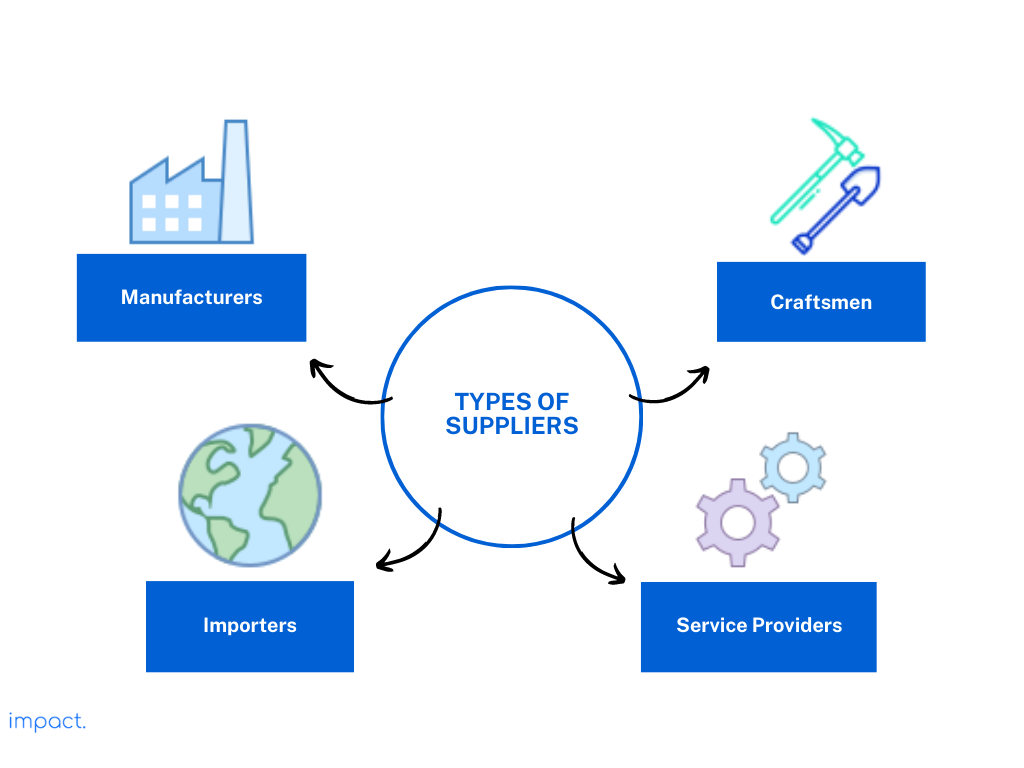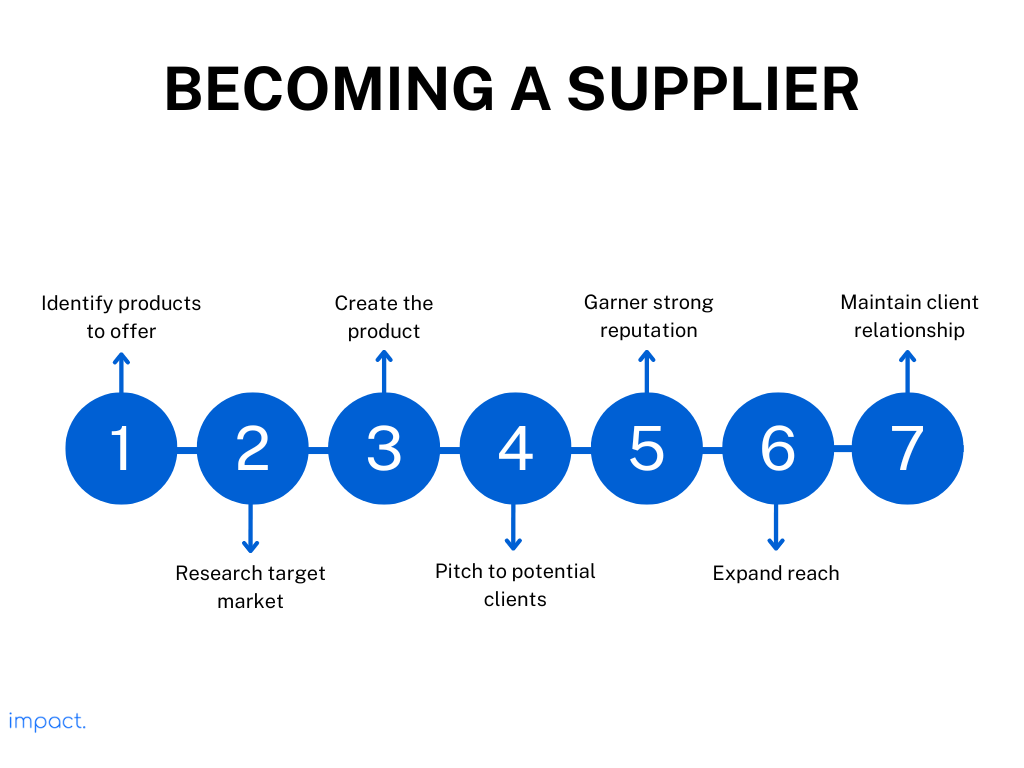Kanban: Definition, 6 Rules, and its Benefits
Kanban is a crucial part of the Just in Time (JIT) system, which we discussed…
Sean Thobias
May 17, 2025When we think of businesses, we often focus on their products or services. However, behind the scenes, a complex web of relationships makes the flow of goods possible.
One key player in the supply chain is the supplier. Suppliers are often confused with wholesalers, distributors, or vendors. So, what is a supplier?
A supplier is a person or company that supplies goods to other organizations. Without them, businesses cannot operate.
The Covid-19 pandemic of 2020 is evidence of that. Many businesses cannot meet consumers’ needs when supply suffers disruptions.
When confronted with these obstacles, numerous companies reevaluate their approaches and make changes. They allocate resources toward more advanced technologies to enhance their supply chain’s resilience.
This article will delve deeper into what a supplier is, how they differ from other types of providers, and why they are so critical to the success of any business.
In a business context, a supplier refers to an entity that provides goods and services as part of the supply chain. They play a critical role in providing the majority of the value of a particular product.
Suppliers can be either manufacturers who produce the goods themselves or distributors who procure the products from manufacturers.
A contract usually specifies the relationship between a supplier and their clients. The conditions may include pricing, quality standards, and delivery schedules.
It is crucial to note that suppliers are distinct from distributors, drop shippers, wholesalers, and resellers.
| Business | Task |
| Suppliers | Provide goods & services |
| Wholesalers | Buy goods in bulk from suppliers and sell to retailers |
| Distributors | Deliver products to retailers |
| Drop shippers | Promote products without stocking them |
| Resellers | Sell products from a specific party |
Read More: What is a Distributor? Definition & 5 Factors to Consider
Although it may seem simple, the function of a supplier plays a crucial role in the business cycle. Imagine if the supply of materials were to stop or if the quality was defective; it would undoubtedly affect the products produced by manufacturers.
Besides providing goods and services to businesses, suppliers also have other functions. Here are some examples:
Suppliers must ensure they comply with all relevant laws and regulations related to product safety, environmental standards, and labor laws. They are responsible for providing documentation and certification to demonstrate compliance.
It is the responsibility of suppliers to ensure that the goods and services they provide meet the quality standards required by their customers. They must monitor their production processes and conduct quality checks to ensure their products are high quality.
Suppliers ensure that all merchants have equal access to goods and services, regardless of affiliation. Suppliers’ fair treatment helps establish loyal customers who may promote the products to others.
Maintaining the trust of retailers is essential. Therefore, suppliers must provide them with pricing strategies with the best value for money. This is essential to establish a long-term business relationship and increase the likelihood of repeat business in the future.
Suppliers play a crucial role in the success of any retail business, regardless of its size or inventory. While some suppliers may contact the company through their sales representatives, businesses should also seek suppliers independently.

Businesses should consider the value and characteristics of their products to ensure they are working with suitable suppliers. Based on these factors, they should look out for four types of suppliers:
Manufacturers are businesses that produce goods from raw materials or components. They sell their products in bulk to retailers, who then sell them to consumers.
Businesses needing large quantities of a specific product can work with manufacturers to save costs and customize their products. An example would be an F&B company that may want to work with a manufacturer to produce its packaging.
Craftsmen, sometimes called artisans or tradesmen, create unique and handmade products. They often cater to small businesses.
Due to the limited quantity craftsmen produce, businesses can offer exclusive products to their customers. Examples of craftsmen-supplied companies may include handmade jewelry, clothing, and furniture stores.
However, working with craftsmen can also have some challenges. Handmade products may have longer lead times and higher costs.
Importers specialize in bringing products from foreign countries to sell in their home country. These businesses may sell sourced products to other companies or directly to consumers.
Importers can provide businesses with various products that may not be readily accessible locally. It can be advantageous for companies looking to offer unique items.
However, partnering with importers has its downsides. Bringing products from abroad may incur additional costs such as shipping, customs duties, and taxes.
Some businesses offer services instead of physical products. These providers can supply companies with the specialized expertise that may not be available in-house. Examples of businesses that provide services to other companies include marketing agencies, consulting firms, and IT providers.
Establishing a positive working relationship with suppliers is essential to gain a competitive edge. Rather than just treating them as vendors, businesses should consider them as partners. When done correctly, it can unlock numerous advantages, such as:
Building a strong partnership with suppliers can lead to cost savings. Businesses can negotiate better pricing, payment terms, and bulk discounts.
Working closely with suppliers can lead to discovering new products, materials, and technologies. Suppliers may have access to new ideas and emerging trends to help businesses stay ahead of the competition.
Toyota, for example, has a strong relationship with its suppliers. This has enabled the automaker to develop new technologies for its products continuously. Furthermore, this partnership helps Toyota remain resilient even during supply chain disruptions.
A business with a high-quality supplier can access better materials, equipment, and expertise. The relationship can improve product quality, increasing customer satisfaction, loyalty, and a good reputation. Working with a supplier also helps businesses improve their quality control processes.
Working with suppliers offers businesses flexibility. They can choose from various ordering, production, and delivery options.
Suppliers can adjust orders and production schedules. This helps companies to meet changing demands and manage inventory levels efficiently.
Suppliers also offer expedited shipping or just-in-time delivery. These delivery types allow businesses to get products when needed. This flexibility helps companies adapt quickly to market changes and improves overall efficiency.
Regular feedback helps businesses and suppliers to pinpoint weaknesses and make improvements. By receiving feedback, suppliers can gain insights into the products that companies prefer and how they should be packaged. Feedback helps enhance the relationship and improve the quality of products and services.
While working with suppliers can offer many benefits, there are also some disadvantages to consider, such as:
When a business imports its supplies, issues with communications can occur. This barrier can cause misunderstandings, delays, and mistakes, affecting the flow of goods.
Companies can clarify expectations and provide cultural training to help prevent these issues. Additionally, investing in better technology can help improve communications with suppliers.
Businesses have relied heavily on suppliers to function and meet consumer demands. Any unforeseen disruptions can impact their operations, and the Covid-19 pandemic has shown the supply chain’s vulnerability.
Companies worldwide need to be proactive in managing these risks by creating contingencies. They can diversify their supply or invest in technology and data analytics to maintain supply chain resilience.
Enterprise resource planning (ERP) solutions are one technology that can help businesses manage their supply chain more effectively. Impact ERP’s manufacturing module allows companies to track the availability of raw materials in real time. ERP ensures that they have the necessary resources to meet their production needs.
Price fluctuations in raw materials and other inputs provided by suppliers can impact the cost of goods or services produced. Changes in supply and demand, natural disasters, or currency fluctuations can cause price fluctuations.
These price changes can impact the business’s profitability. Companies must monitor market trends and work with suppliers to manage these risks effectively.
Intellectual property issues may arise when a supplier can access a business’s confidential information or trade secrets. This information may include valuable designs, manufacturing processes, and other proprietary information that give the industry a competitive edge.
Companies can prevent intellectual property issues by implementing non-disclosure agreements, limiting access to sensitive information, and monitoring supplier activities. They can also take legal action against any supplier who breaches confidentiality or misuses their intellectual property.
Businesses rely on the goods that suppliers provide. If the goods received from the suppliers are not up to standard, several consequences may arise.
Poor quality products or services from a supplier result in increased costs, lower sales, and damage to a company’s reputation. Negative reviews or word-of-mouth feedback can harm a company’s brand and image, causing a decline in trust and confidence from customers and stakeholders.
We just mentioned the challenges that businesses face when working with a supplier. However, this should not prevent them from choosing suppliers.
Suppliers are essential in maintaining the flow of goods in the supply ecosystem. A good supplier can bring satisfaction to customers.
What are the factors to consider?
Payment terms: Favorable payment terms help manage cash flow, reduce risk, and avoid penalties. Carefully evaluate payment terms offered

Businesses can become suppliers by identifying the products or services they can offer potential clients. It is vital to research and understand the specific needs of the target market to create a product or service that meets their demands.
Once the product or service is ready, businesses can approach potential clients and make a sales pitch, highlighting the product’s benefits. Building a solid reputation through positive reviews and referrals can help enterprises to attract new clients and expand their supplier network.
Additionally, businesses can explore online platforms and directories to connect with potential clients and expand their reach. Maintaining open communication and establishing a solid working relationship with clients is essential to ensure long-term partnerships.
The table below outlines the advantages and disadvantages of becoming a supplier. However, it is essential to note that this will vary depending on the industry, market, and client base.
|
Advantages |
Disadvantages |
| Potential for steady and reliable income | High competition for contracts |
| Opportunity to establish long-term partnerships | Dependence on a small number of large clients |
| Increased visibility and credibility in the market | Pressure to maintain high levels of quality and service |
| Opportunities for growth and expansion | Difficulty in securing payment on time |
| Access to new markets and clients | Potential for disruption due to changes in client demands |
| Possibility for economies of scale | Potential for legal disputes or contract breaches |
| Opportunities for collaboration and knowledge-sharing with clients | Cost of complying with client requirements and regulations |
| Improved financial stability and cash flow | Need to invest in technology and infrastructure to meet client demands |
Suppliers are critical to the success of any business. They are the backbone of the supply chain, providing the goods and services that enable businesses to operate.
Suppliers can be manufacturers or distributors; their role goes beyond providing products. They must also ensure compliance with regulations, maintain product quality, promote fair trade practices, and research optimal pricing.
As seen during the Covid-19 pandemic, disruptions to the supply chain can have severe consequences. Businesses must prioritize supplier relationships and supply chain resilience to be successful.
Impact Insight Team
Impact Insights Team is a group of professionals comprising individuals with expertise and experience in various aspects of business. Together, we are committed to providing in-depth insights and valuable understanding on a variety of business-related topics & industry trends to help companies achieve their goals.
Ask about digital transformation, our products, pricing, implementation, or anything else.
We are excited to be part of your transformation journey from day one.
